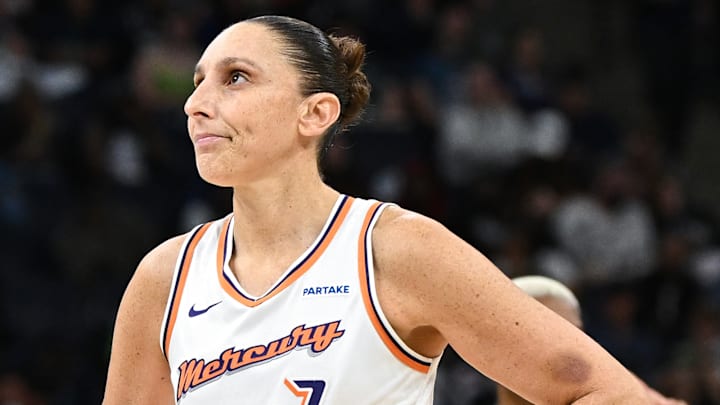Prime Video's three-part docuseries Taurasi dropped Thursday, August 7 — just ahead of one of the most dramatic parts of the WNBA season, and as upcoming CBA negotiations continue to hang over the heads of everyone involved.
The CBA and the push from players for higher salaries is also somewhat of a background character in the second episode of the series, when Taurasi breaks down her decision to play basketball overseas in Turkey and Russia — and to encourage teammates like Brittney Griner to do the same. (Griner was detained in the country for nearly 300 days in 2022 after she accidentally entered with cannabis in her suitcase.)
Though going overseas to play basketball during the league's offseason isn't new for WNBA players, it's something that shouldn't have to be necessary. The primary motivating factor isn't travel or to experience a new culture (after all, basketball players don't really get a lot of downtime in the first place), it's money — money that WNBA players still can't seem to be able to earn playing right here at home.
"I’m the best player in the world, and I have to go to a communist country to get paid like a capitalist," Taurasi explains at one point in the episode. "The f---ing janitor at the arena made more than me."
Playing overseas during the offseason comes with risks
While players can make a lot of money playing overseas, doing so comes with plenty of risks. Griner's 2022 detention was an extreme example of what can go wrong; plenty of players face more stereotypical problems, like injuries they wouldn't have had if they were paid appropriately by the WNBA or playing for teams that lack the appropriate facilities and trainers.
Taurasi signed a $42,000 per year salary when the Mercury after she was drafted as the No. 1 overall pick in the 2004 draft. Twenty years later, Caitlin Clark signed a $76,535 rookie deal after she was selected in the same spot by the Indiana Fever — an increase of roughly $34,000.
In 2023, Taurasi signed what is still considered a landmark $469,872 two-year deal with the Mercury. Constructing the deal required Griner — who had only just returned to the Mercury following her detention in Russia the year before — to take a 32% pay cut to make it happen. Taurasi made $1.38 million total from her WNBA salary in 20 years of play.
Salary and revenue sharing adjustments aren't the only crucial parts of the CBA negotiations, but they are certainly the essential ones: without adequate pay, athletes will continue to find alternative ways to simply do their jobs, and will have to keep navigating the risk that comes with those decisions.
